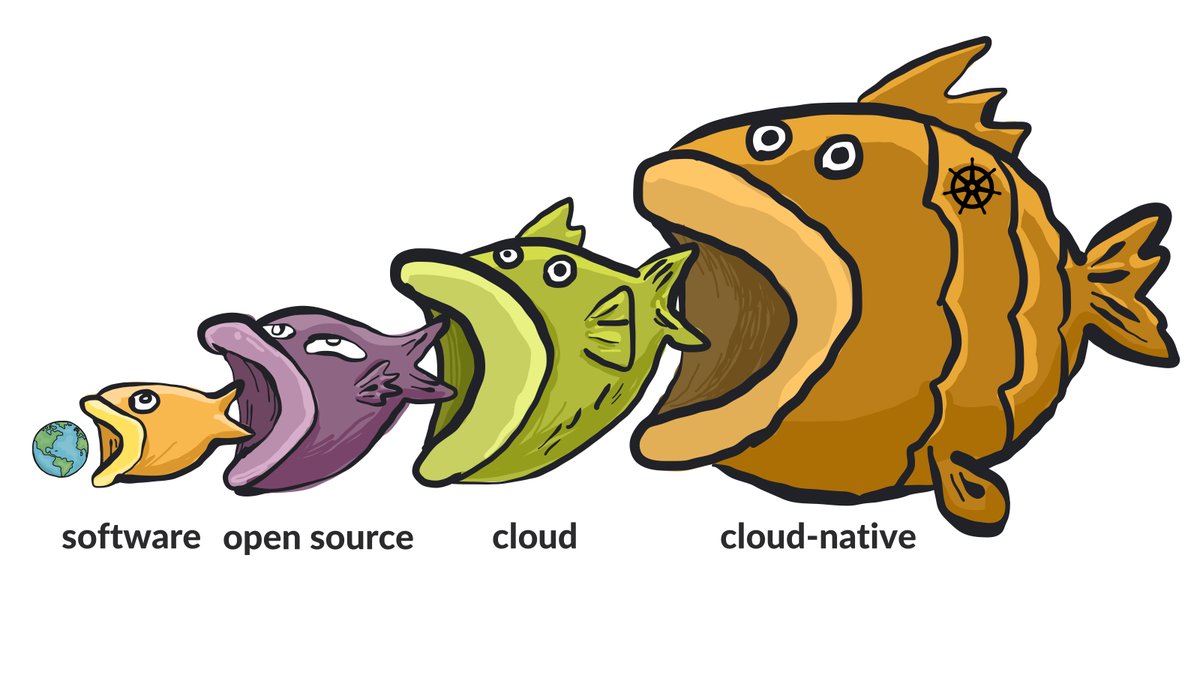Platform.sh
Building a cloud-friendly application
Presented by Larry Garfield (@Crell)
@Crell

- Director of DX, Platform.sh
- PHP-FIG Core Committee
implements Huggable
 (Source: @bassamtabbara)
(Source: @bassamtabbara)
What is cloud
computing?
computing?
What is
The Cloud?
The Cloud?
These are separate questions...
The Cloud™: noun
Someone else's hard drive
Cloud computing: noun
Abstracting away physical infrastructure
Disposable application design
What makes an application cloud-friendly?
They're not rules

They're more like guidelines
Split code from content
Code
- Provided by developer
- Carefully tested
- Lives in version control
- Read-only runtime
Content
- Provided by users
- Frequently ad hoc
- Lives in DB or filesystem
- Writeable runtime
Don't mix the filesystems
Your application is disposable. Your data is not.
Data flow
You don't get an in-between option
Take-away
Cleanly separate "Dev provided" and "user provided" files
What is configuration?
Does config come from the developer or the user?
Git or Database?
Drupal Config Management

- Configure in UI / DB
- Export to YAML
- Commit to Git
- Push / Pull
- Import back to DB
Take-away
Decide
What happens at runtime
stays at runtime
Dependency inject your environment
- DB credentials (Solr, Redis, etc.)
- API keys
- All paths on disk
- Domain names
Environment variables
getenv('foo');
$_ENV['foo'];
$_ENV['foo']['bar'];
Need glue code

Platform.sh / SensioCloud
Symfony 3
// platform_parameters.php
// Configure the database.
if (isset($_ENV['PLATFORM_RELATIONSHIPS'])) {
$dbRelationshipName = 'database';
$relationships = json_decode(base64_decode($_ENV['PLATFORM_RELATIONSHIPS']), true);
foreach ($relationships[$dbRelationshipName] as $endpoint) {
if (!empty($endpoint['query']['is_master'])) {
$container->setParameter('database_driver', 'pdo_'.$endpoint['scheme']);
$container->setParameter('database_host', $endpoint['host']);
$container->setParameter('database_port', $endpoint['port']);
$container->setParameter('database_name', $endpoint['path']);
$container->setParameter('database_user', $endpoint['username']);
$container->setParameter('database_password', $endpoint['password']);
$container->setParameter('database_path', '');
break;
}
}
}
// Set a default unique secret, based on a project-specific entropy value.
if (isset($_ENV['PLATFORM_PROJECT_ENTROPY'])) {
$container->setParameter('kernel.secret', $_ENV['PLATFORM_PROJECT_ENTROPY']);
}
Platform.sh / Symfony 4
// Set the DATABASE_URL for Doctrine, if necessary.
if (!isset($_ENV['DATABASE_URL'])) {
if (isset($_ENV['PLATFORM_RELATIONSHIPS'])) {
$dbRelationshipName = 'database';
$relationships = json_decode(base64_decode($_ENV['PLATFORM_RELATIONSHIPS']),true);
foreach ($relationships[$dbRelationshipName] as $endpoint) {
if (!empty($endpoint['query']['is_master'])) {
$dbUrl = sprintf("%s://%s:%s@%s:%s/%s?charset=utf8mb4&serverVersion=10.2",
$endpoint['scheme'], $endpoint['username'], $endpoint['password'],
$endpoint['host'], $endpoint['port'],
$endpoint['path']);
break;
}
$_ENV['DATABASE_URL'] = $dbUrl;
}
}
else {
// Hack the Doctrine URL to be syntactically valid in a build hook, even
// though it shouldn't be used.
$dbUrl = sprintf("%s://%s:%s@%s:%s/%s?charset=utf8mb4&serverVersion=10.2",
'mysql', '', '', 'localhost', 3306, '');
$_ENV['DATABASE_URL'] = $dbUrl;
}
}
// Set the application secret if it's not already set.
if (!isset($_ENV['APP_SECRET']) && isset($_ENV['PLATFORM_PROJECT_ENTROPY'])) {
$_ENV['APP_SECRET'] = $_ENV['PLATFORM_PROJECT_ENTROPY'];
}
In the container
parameters:
app.connection.port: '%env(int:DATABASE_PORT)%'
parameters:
project_dir: '/foo/bar'
env(DB): 'sqlite://%%project_dir%%/var/data.db'
db_dsn: '%env(resolve:DB)%'
parameters:
env(SOME_VALUE): 'NWE3OWExYzg2NmVmZWY5Y2ExODAwZjk3MWQ2ODlmM2U='
app.some_value: '%env(base64:SOME_VALUE)%'
env(NUM_ITEMS): 'App\\Entity\\BlogPost::NUM_ITEMS'
app.num_items: '%env(constant:NUM_ITEMS)%'
Request::setTrustedHosts()
Constants?
Take-away
Dependency inject your environment
User-configured connections
Installers
- Ask for DB credentials
- Ask user for basic site info
- Write credentials to config file
- Populate DB
- Write basic site info to config file/DB
- Profit!!!
Cloud
Better installers
- Pre-include connection glue
- Installer skips pre-populated values
- Do not download from installer
Avoid lock-in
Always be able to
take your business elsewhere.
Use Free Software
Use replaceable services
Google has killed...
- Reader
- iGoogle
- Google Talk
- Google Health
- Knol
- Google Insights
- Picnik
- Buzz
- Aardvark
- Sidewiki
- Notebook
- Dictionary
- Labs
- Wave
- SearchWiki
- Dodgeball
- Jaiku
- Lively
- Page Creator
- Zeitgeist
- Answers
- Google X
- Catalog
- Web Accelerator
- Video Player
- Sets
- SearchMash
- Writely
Source: WordStream (2015)
Safe
- MySQL/MariaDB
- PostgreSQL
- MongoDB
- RabbitMQ
- Solr/Elasticsearch
- InfluxDB
Unsafe
- Amazon RDS
- Amazon DynamoDB
- Azure Cosmos DB
- Anything you can't replace in a day
To summarize...
Remember what they say when you assume
* Runtime
* Application needs to run in different environments
* Prod, multi-head, staging, other staging, your laptop, colleague's laptop, testing, etc.
* Assume nothing about the environment!
* Dependency inject your environment
* Environment: Credentials, paths, domains
* environment variables
* Ask Damien about env var alternative?
* What is a cloud host?
* Infra is abstracted away from you
* Disposable applications
* Split code from content
* Configuration is code or content
* Ref Drupal?
* For SF, mostly code.
* Runtime connections
* Env vars
* place for glue
* Ref Symfony?
* Need to discuss env component here
* Constants for config suck
* Can't easily override, makes glue harder
* Installers
* No disk write
* Allow pre-defined creds
* Even UI services need code-provided creds
* Relative paths
* Boot fast
* PHP's got this covered
* Cache warm in build if you can
* Allow lazy-cache building
* No services build
* Don't assume number of webheads
* Don't use cloud-specific proprietary tools.
* Be able to move.
Larry Garfield
@Crell
Director of Developer Experience Platform.sh
Continuous Deployment Cloud Hosting
Stalk us at @PlatformSH